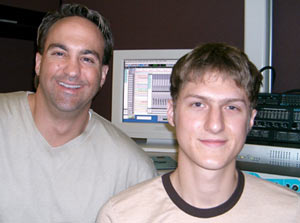 |
|
Randy and Jor
|
3.5.2 for Mac
VST-RTAS Adapter
We are currently working on a new release of the UAD-1 software, version 3.5.2. This will bring a few fixes to the Mac, and will include support for an updated version of the Fxpansion RTAS adapter, which will reduce the latency incurred when using the UAD-1 plug-ins. Even though Pro Tools LE does not support automatic delay compensation, this improvement in the latency will allow the proper use of the UAD-1 Delay Comp plugin. For more information regarding the use of the UAD-1 Delay Comp plugin in Pro Tools LE, please see the May 2004 Support Report for more detailed information. The UAD-1 version of the Fxpansion adapter will be available for download at my.uaudio.com. The full version will be available on fxpansion.com and will be released concurrently with the release of 3.5.2.
DP
The 3.5.2 release will also re-enable the use of MISO plugins (mono-in-stereo-out) when using Digital Performer. This was disabled in the last release in anticipation of a compatibility update to DP. The required DP update from MOTU is available now.
Bypass
Also in this release we have made a few changes regarding DSP usage when bypassing plugins in host applications. Every host application deals with bypassing plugins differently. In most hosts, this code change will help free DSP usage on the card when bypassing the UAD-1 plugins from within the host itself.
G5 Multicard
We have also made a few minor changes regarding multiple cards in the G5. Performance has been increased when using multiple cards in the G5, when using Firewire or USB audio interfaces. Please remember that the current models of the G5 are still not performing at a maximum level. We are still working with Apple to resolve these issues. In the meantime we are doing everything that we can to optimize all levels of performance on the G5. We have also made a few other overall performance increases and fixed a few minor bugs. This demonstrates Universal Audio's commitment in delivering the best plug-in platform on the market. As the 3.5.2 release approaches and finishes the beta cycle, complete release notes will be available on the website, detailing all of the fixes and improvements in this release. Stay tuned, as in the coming months I will be writing a series of articles on tips and tricks using your favorite Macintosh DAW application.
-Randy Knaub
Windows System Performance
AMD Opteron technology and the UAD-1
We haven't put together a full compatibility matrix for Opteron and Athlon-64 chipsets yet, however we have some preliminary information that can be useful for selecting system configurations. The chipsets available for the Opteron and Athlon-64 include the AMD-8131 (PCI/PCI-X), AMD-8111 (PCI), VIA K8T800 (PCI), and nVidia (we haven't tested this yet).
Based on our tests and feedback from our beta testers, the VIA chipset is by far the best available. It performs extremely well, and several on-line comparison reports have shown that Opteron and Athlon-64 systems using it perform very well. The AMD-8131 works, but it requires setting the AMD-8131 mode in the UAD-1 Meter, which improves UAD-1 DSP performance, but reduces host CPU performance because of issues with this chip's PCI bus arbitration logic. The UAD-1 works well with the AMD-8111, but some systems using this chip along with the AMD-8151 AGP controller do not. The Tyan S2875 uses this configuration.
Based on preliminary reports on some of the Asus and Tyan Opteron boards, we currently don't recommend them for use as DAWs because the system architecture is not designed for low-latency media processing (most are designed as servers, which are not suitable for use as DAWs for many reasons).
Based on our initial analysis, our position is that some HyperTransport-based systems have been released too soon, while others are generally not suitable for use as DAWs with or without the UAD-1. The problems are not due to HyperTransport or the AMD 64-bit processors, but rather the system chipsets and system bus architecture.
For trouble-free operation and best performance, we strongly recommend using the VIA K8T800 chipset, as this has demonstrated both superb performance in all applications, and is the benchmark with which all other HyperTransport chipsets should be measured.
For optimal DAW performance regardless of system type, we recommend putting audio devices on their own PCI bus segment to avoid audio performance degradation. Since most high-performance systems typically have multiple PCI segments, this can be done easily. Keep in mind that nearly *all* peripheral devices in the computer are connected to the system using PCI (which stands for Peripheral Component Interconnect), either using internal PCI segments within a chipset, or sharing external PCI segments with the PCI slots. The best systems have multiple PCI segments to isolate performance bottlenecks.
Windows Analysis Systems
For analyzing Windows systems, we recomemend using SiSoft's Sandra performance analysis software. This is available as a free download at http://www.sisoftware.net . For people insterested in full PCI system analysis, including bus topology and IRQ routing and sharing, we recommend using ApSoft's PCIScope, a 14-day demo version is available on-line at http://www.tssc.de .
Regardless of bus bandwidth and clock/memory speeds, the system chipset's I/O queue depth largely defines system performance. The more I/O segments there are in a chipset (memory, AGP, PCI, etc.), the higher this number needs to be to avoid delays caused by data transfers blocking each other.
Finally, it's very important to remember that the amount of money spent on a system has little to do with how well it will perform as a DAW. It's very easy to spend several thousands of dollars on a backbone server platform that will perform terribly as a DAW.
-Jor Van Gelder
Questions or comments on this article?